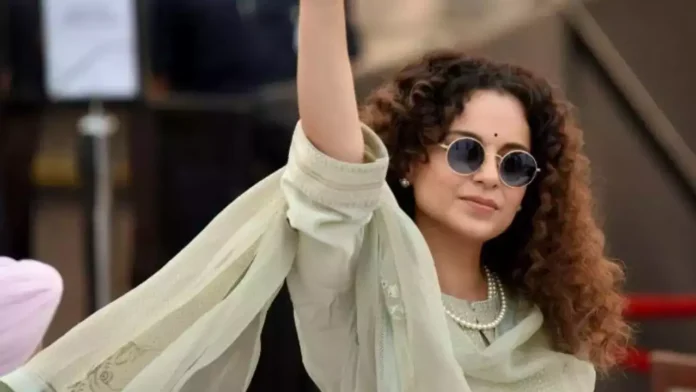Recently, Bollywood actress Kangana Ranaut faced a tumultuous reception in the picturesque district of Lahaul and Spiti in Himachal Pradesh, where she was shown black flags by protesters. The incident has sparked controversy and drawn attention to the intersection of politics, celebrity, and public opinion in India’s dynamic social landscape. As tensions simmer, the Bharatiya Janata Party (BJP) has taken swift action by filing a complaint with the Chief Electoral Officer (CEO), raising questions about the nature of dissent and the boundaries of free speech in a democratic society.
Kangana Ranaut, known for her outspoken views and bold persona, has been a lightning rod for controversy in recent years. Her unapologetic statements on social and political issues have earned both admirers and detractors, with opinions sharply divided along ideological lines. Against this backdrop, her visit to Lahaul and Spiti, a region known for its natural beauty and tranquil surroundings, was expected to be a peaceful affair. However, the actress’s presence soon became the focal point of a heated debate, with protesters expressing their disapproval through symbolic gestures.
The display of black flags by protesters during Kangana Ranaut’s visit to Lahaul and Spiti sent shockwaves through the region. The act, interpreted as a form of protest against the actress’s controversial remarks and political affiliations, underscored the deep-seated tensions that exist within Indian society. For some, the black flags were a symbolic expression of dissent, reflecting concerns about freedom of expression and the need to hold public figures accountable for their statements and actions.
However, the incident also highlighted the polarizing nature of celebrity activism and the challenges of navigating the intersection of politics and entertainment. Kangana Ranaut’s vocal support for the ruling BJP government and her confrontational stance towards dissenting voices have made her a lightning rod for criticism, particularly among opposition parties and civil society groups. The black flags in Lahaul and Spiti served as a reminder of the complexities of public perception and the diverse range of opinions that exist within society.
In response to the incident, the BJP wasted no time in taking action, filing a complaint with the Chief Electoral Officer (CEO) against those responsible for showing black flags to Kangana Ranaut. The party argued that the protest was politically motivated and aimed at intimidating the actress, thereby violating her rights as a citizen. The complaint further alleged that the protesters’ actions constituted a breach of electoral conduct rules and called for stringent action against the culprits.
The BJP’s decision to file a complaint with the CEO has added fuel to the fire, intensifying the debate over the incident and its implications for free speech and democratic norms. Critics of the party have accused it of attempting to stifle dissent and curtail freedom of expression by targeting those who express dissenting views. They argue that the black flags were a legitimate form of protest and should be seen as an exercise of democratic rights rather than a violation of electoral conduct rules.
Amidst the controversy, Kangana Ranaut has remained defiant, refusing to be cowed by the protests in Lahaul and Spiti. In a series of tweets, the actress condemned the black flags as a sign of intolerance and accused her detractors of attempting to silence her voice. She reiterated her commitment to speaking out on issues of national importance and called on her supporters to stand firm against attempts to suppress dissent.
As the debate rages on, the incident in Lahaul and Spiti serves as a microcosm of larger societal tensions and the complexities of navigating the intersection of politics, celebrity, and public opinion. It raises important questions about the boundaries of free speech, the responsibilities of public figures, and the role of dissent in a democratic society. Ultimately, the resolution of this controversy will require a nuanced understanding of these issues and a commitment to upholding democratic values and principles.

